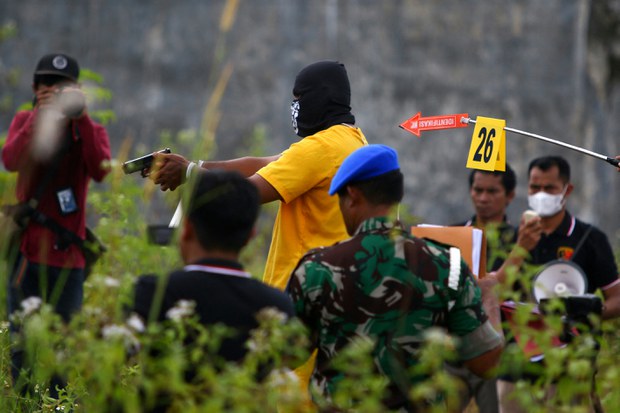Activists blame Indonesian police, soldiers for dozens of extrajudicial killings
2022.12.09
Jakarta
 A suspect aims his gun during a crime reconstruction in Mimika, Papua, Indonesia after he and five other Indonesian soldiers were accused of killing four indigenous Papuans and mutilating their bodies, Sept. 3, 2022.
A suspect aims his gun during a crime reconstruction in Mimika, Papua, Indonesia after he and five other Indonesian soldiers were accused of killing four indigenous Papuans and mutilating their bodies, Sept. 3, 2022.
Ahead of Human Rights Day on Saturday, activist group KontraS blamed Indonesian police and soldiers for more than 70 extrajudicial killings in the past year, including many in the troubled Papua region.
At least 50 extrajudicial killings were committed by the police in the past year, KontraS said in its report on the state of human rights in Indonesia released Friday. The group blamed members of the Indonesian Armed Forces (TNI) for committing another 22 killings.
The Southeast Asian country is notorious for impunity when it comes to human rights abuses committed by government security personnel.
“The widespread practice of extrajudicial killings throughout 2022 by security personnel shows that they are like wolves in sheep’s clothing who are ready to pounce when there’s an opportunity,” KontraS researcher Rozy Brilian told reporters.
The report by the Commission for Disappeared and Victims of Violence (KontraS) covers killings of protesters, petty criminals and alleged militants that were recorded between December 2021 and the end of November 2022.
Most victims allegedly killed by police were under criminal investigations and at least 12 of the cases involved torture, Rozy said.
Victims include a 21-year-old farmer who was shot in February while taking part in a protest to oppose a gold mine in Parigi Moutong regency, Central Sulawesi, and a man who allegedly stole a motorcycle near Jakarta in January.
Inspector General Dedi Prasetyo, the national police spokesman, said he could not comment on the KontraS report because he had not read it. Military officials did not respond immediately to BenarNews requests for comment.
Indonesians face shrinking civil liberties and a lingering culture of violence and impunity among security forces, Amnesty International said in a similar report.
It said 36 people were killed by security forces and separatist rebels in the Papua and West Papua provinces this year, an increase from 28 in 2021.
“Of the cases allegedly perpetrated by security personnel, none have been prosecuted in public courts,” said Fauziah Mayangsari, an Amnesty researcher in Indonesia.
Soldiers arrested in killings
Six Indonesian soldiers have been arrested in connection with the deaths of four Papuans whose mutilated bodies were found in August in Mimika Baru, a district in Mimika regency.
KontraS said its investigation of the killings contradicted allegations by police that one of the four dead people had ties to a Papuan armed separatist group.
Police also alleged that the killings in Mimika Baru were linked to an illegal weapons purchase.
The Amnesty report noted the frequent use of excessive force by police, including the firing of tear gas that led to a stampede at the Kanjuruhan Stadium in Malang which killed more than 130 people following a football match on Oct. 1.
“Law enforcement officials must put an end to violence and a culture of impunity. The violence is a form of abuse of power and is exacerbated by the low level of accountability,” said Usman Hamid, Amnesty Indonesia director.
The reports were released a day after a court found a retired Indonesian military officer not guilty of charges stemming from security forces fatally shooting four teenage protesters in Papua’s Paniai regency in 2014.
While the five-member panel ruled that Isak Sattu could not be held responsible even though the shooting was a human rights violation, two of the judges issued a dissenting opinion on Thursday.
The trial was based on a human rights tribunal law passed in 2002 allowing the creation of ad hoc courts to try rights abuse cases.
The Papua region, at Indonesia’s far-eastern tip, has been the site of a decades-old separatist insurgency where both Indonesian security forces and rebels have been accused of committing atrocities against civilians.
In 1963, Indonesian forces invaded Papua – like Indonesia, a former Dutch colony – and annexed the region.
Six years later, only about 1,000 people voted in the U.N.-sponsored referendum, called a sham by locals and activists. The U.N. accepted the vote, essentially endorsing Jakarta’s rule.







